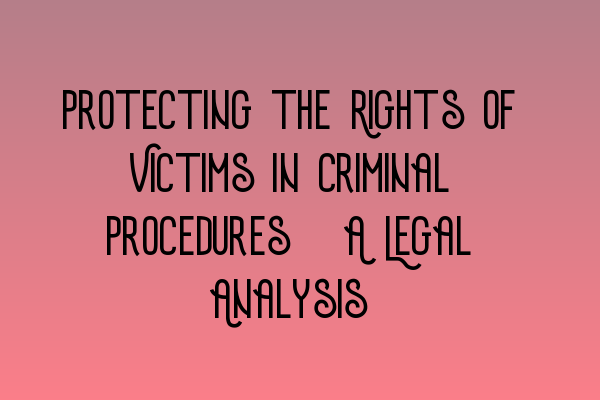Protecting the Rights of Victims in Criminal Procedures: A Legal Analysis
In criminal procedures, it is essential to prioritize the rights of victims to ensure a fair and just legal process. Victims are often the most vulnerable individuals in criminal cases, and it is crucial to protect their interests throughout the proceedings. This blog post will provide a comprehensive legal analysis of the measures implemented to safeguard the rights of victims in criminal procedures.
The Rights of Victims: A Fundamental Aspect of Criminal Law
Victims play a crucial role in criminal cases, and their rights must be respected and protected. One key aspect of victim protection is providing them with access to justice. This means ensuring that victims have access to legal representation, information about the progress of the case, and the ability to participate in relevant proceedings.
Another important right for victims is the right to privacy. Victims may be hesitant to come forward and report crimes due to fears of retaliation or public exposure. It is imperative that their personal information is kept confidential to prevent further harm and encourage victims to seek justice without fear.
The Importance of Support and Assistance
Support and assistance are crucial for victims throughout the criminal process. Victims may experience physical and emotional trauma as a result of the crime committed against them. Providing access to support services, such as counseling or therapy, can help victims cope with the impact of the crime and facilitate their recovery.
In addition to emotional support, victims may also require financial assistance to cover medical expenses or loss of earnings. Establishing compensation schemes or funds can provide victims with the necessary financial support to help them rebuild their lives.
Victim Participation and Restorative Justice
Victim participation in criminal procedures is an essential aspect of ensuring a fair and just process. Allowing victims to participate in hearings, provide impact statements, and express their views on sentencing can help restore their sense of agency and promote a more victim-centric approach to justice.
Restorative justice practices can also contribute to protecting the rights of victims. These practices focus on facilitating dialogue and understanding between the victim and the offender, aiming to repair the harm caused by the crime instead of relying solely on punitive measures. Implementing restorative justice initiatives can offer victims a sense of closure and empowerment.
Conclusion
In conclusion, protecting the rights of victims in criminal procedures is of utmost importance. By prioritizing victim support, participation, and privacy, we can create a legal system that upholds fairness and justice for all parties involved. If you want to learn more about criminal law and practice in the UK, make sure to check out our related articles:
